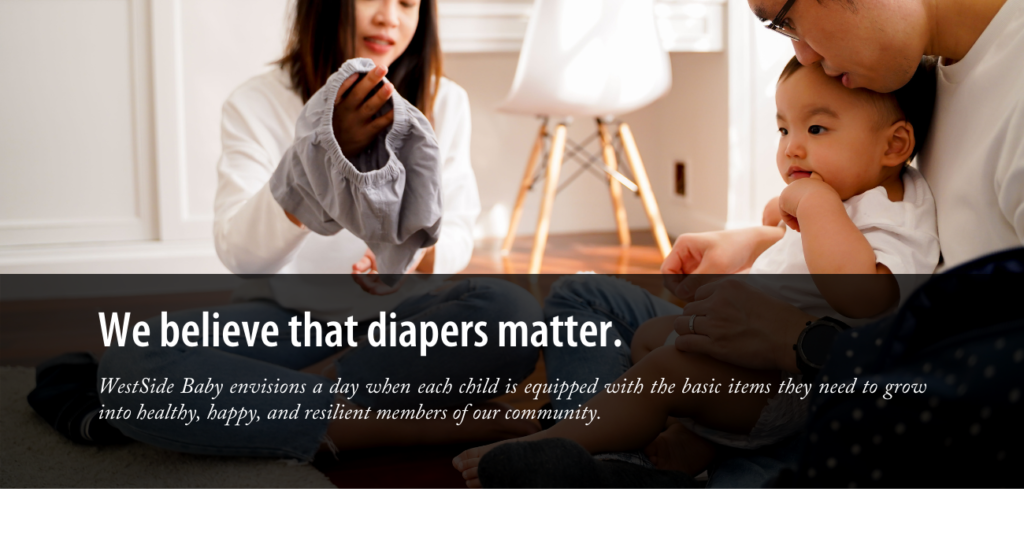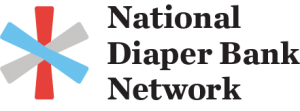
Diaper Need
Few people realize that unlike other essentials such as food or health insurance, there is no federal assistance for purchasing diapers. SNAP (or Food Stamps) and WIC (Women, Infants and Children – supplemental nutrition program) do not cover diapers. As a result, parents must re-use dirty diapers, or use paper towels and plastic bags when they can’t afford to purchase diapers. Many low-income parents stretch the time between diaper changes which puts children at risk for painful rashes and infections. It’s not surprising to learn studies show that mothers who are unable to afford diapers for their babies are more likely to suffer from maternal depression and mental health issues.
Compounding the problems of struggling parents is the fact that most child-care centers require a one-day supply of disposable diapers. Parents who cannot provide disposable diapers for their children are unable to access childcare, impeding their ability to go to work or attend school.
Diaper prices have risen at alarming rates since the beginning of the pandemic, becoming more expensive and inaccessible to working families. According to the Wall Street Journal, prices rose over 12% in under 2 years from the end of 2019 to June of 2021. This means that low-income families spend nearly 14% of their monthly income on diapers.
In Seattle and King County…
A 2019 survey of King County families with children aged 6 months through 5th grade asked: “whether or not families have struggled to afford basic needs since the child was born.” In 2017, 23% of children in King County lived in families that found it difficult to afford diapers since the child was born. This survey also informed us of the ways certain families are disproportionately impacted by diaper need:
- Families are impacted by where they live: Families living in south King County, for example, are 13% more likely to experience diaper need than average.
- Families are impacted by race: Compared to White families, families who identified as Native Hawaiian/Pacific Islander were 42% more likely to experience diaper need. Latino families were 18% more likely to experience diaper need than White families.
- Families are impacted by language spoken at home: Families who spoke primarily Somali and families who spoke primarily Spanish were 56% and 15% more likely to struggle with diaper need compared to King County average, respectively.
At the national level…
- Low-income families pay up to 14% of their entire income just for disposable diapers.
- WestSide Baby estimates a healthy supply of diapers for a newborn costs approximately $75-$100 per month – much too costly for many families making the minimum wage.
- The Federal government reports that nearly 1 in 3 American families struggle with affording enough disposable diapers for their babies.
Public Policy Changes to End Diaper Need
Diaper Subsidy Program in WA
The 2022 legislative session has begun and WestSide Baby and the Washington Diaper Bank Coalition are excited to announce the introduction of The End Diaper Need Act, with bills in both the House and the Senate (See the bills here: HB1947 & SB5838). WestSide Baby legislative champions Representative Noel Frame, Representative Jesse Johnson, Senator T’wina Nobles, and Senator Ann Rivers are leading the way for this important legislation acknowledging the high cost of diapers for families.
The policy solution.
- All Temporary Assistance for Needy Families (TANF) households with children under the age of three will receive a $125/month cash grant increase to help pay for diapers. The grant increase will cause a decrease in Supplemental Nutrition Assistance Program (SNAP) benefits, restricted to food purchasing, but will be offset by the overall increase of TANF funds.
- All TANF families with children under three will experience a positive net increase of unrestricted cash of $40-$60 a month to help pay for diapers.
- This is a per-household grant increase for 7,000 TANF households with an estimated cost of $11 million per year.
Sales Tax on Diapers
For families already living on a limited income, a total of 10.1% in taxes on a necessary and costly item such as a diaper has huge negative impacts on financial decisions. At WestSide Baby, we have heard stories of mothers choosing to keep their baby in a wet diaper all night to prolong its use, or to use t-shirts, towels and other household items to make up for being out of diapers. Additionally, the privilege of buying cheaper diapers in bulk, at a big box store or online is not available to all families when costly memberships or public transportation are a barrier. Families living in poverty may pay double what higher-income families pay because of this diaper price disparity.
- If Seattle were to exempt diapers from the city sales tax, families with newborns would be able to purchase 13 additional diapers a month with the $3 saved on sales tax per month.
- If Washington State also exempted diapers from sales tax, families would be able to purchase 36 additional diapers per month.
You can help end #DIAPERNEED
WestSide Baby collects diapers through community members like you via diaper drives, corporate gifts, and purchases of bulk diapers. Partnerships with Huggies and the National Diaper Bank Network have resulted in large-scale diaper donations. We provide 45 diapers per month per child, free of charge, to as many clients as possible who need them. Our volunteers bundle the diapers and prepare them for distribution.
Host a diaper drive
Host a diaper drive by collecting diapers, wipes, and pull-ups with your community for your community!
Some creative diaper drive ideas include:
- Diaper drive for your baby shower!
- Collect diapers at your child’s school or daycare!
- Have your friends bring diapers to your next house party or get together!

